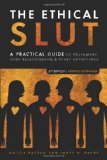I am leading a read-through of the Ethical Slut, 2nd edition. If you’d like to catch up on past installments, check the list at the bottom of the series introduction.
In this installment we discuss Chapter 5, “Battling Sex Negativity”
Before we dive into this month’s chapter, I want to highlight a new project by Janet W. Hardy, one of the authors of The Ethical Slut. Together with Jenée Wilde and Sarah Black, she has started the Female Voice podcast. Their first episode will be posted at midnight tonight (January 27). It will feature an interview with sex expert Tristan Taormino, author of the polyamory book Opening Up, and the subject of the recent OSU Sex Week controversy. This should be an exciting new audio program and I am looking forward to tonight’s episode.
“What is my experience of oppression and how does it affect me? Who do I have to lie to in my life? What are my closets?” — from The Ethical Slut

Chapter 5 of The Ethical Slut is about Sex Negativity — in our selves, as well as the people and society which surrounds us. This chapter contains mostly new material, although the information on making legal agreements outside marriage may have been present in the previous edition. Unfortunately I found this chapter to be a bit of a disappointment. It is very short, and I feel like the main thrust of it comes across as a recommendation to stay in the closet. There isn’t much advice about how to come out of the closet as polyamorous, or what to do if someone outs you against your will.
The funny thing is that the last time I read The Ethical Slut, this short chapter probably would have been enough for me. During the first several years of my sluthood, I was very lucky — I sometimes had conflicts with lovers, as one does, over disagreements, miscommunications, and misunderstandings, but for whatever reason their parents always seemed to love me, and I had few conflicts with the outside world. In 2010 though, that changed when I twice came into conflict with my lovers’ parents.
I’ve always been a very open person and that has only increased as I’ve gotten older, become self-employed, and detached myself more from mainstream, monogamist society. I recognize that I am in a privileged position: I’m not working as a teacher or in another form of employment where my sluthood could endanger me, and I have no children that I have to worry about being taken away from me. I feel like I should live openly for those who cannot. Yet I’ve always been aware that there’s a time and a place to out oneself, and that my relationship decisions are the business of the people in relationships with me, not necessarily their parents or family.
“Unless you are absolutely certain that your employer or your coworker is slut-positive — not just gay, or a swell person with a great fund of dirty jokes, or someone who used to sleep around in college — we recommend a capacious and well-insulated closet.” –from The Ethical Slut

The first incident came when a lover, with whom I have since broken up, told her mother about our polyamorous arrangements. While I understood why my lover did not want to lie when pressed on the issue by her parent, I was doubly startled by the negative reactions she received. In the first place, it was unexpected because her mother was a founding member of a Texas Pagan organization and therefore surrounded constantly by people who had stepped outside the mainstream, including in many cases making nontraditional relationship choices. My lover had been aware of adult authority figures in her community — people who babysat her growing up — that were polyamorous and yet here was hostility when she made those choices for herself. It was a harsh reminder that hostility toward sluts can exist even in “liberal” circles.
That was also the source of my further dismay — I was the one who ended up getting blamed, as if obviously the man in a relationship would be the source of any nonmonogamous choices. In actuality of course we had both entered into the relationship looking for polyamory, and both of us had relationships with others’ that predated our meeting, with no intention of ending them. Yet somehow her mother felt the need to make up reasons why I was doing this, such as suggesting I must have unresolved psychological issues with my own mother.
Unfortunately, later in that year I encountered a much more serious reminder of the consequences of sex negativity. The sister of one of my closest partners outed me as polyamorous to her parents. Though I had previously met them and shared wine and pleasurable conversation, their opinion of me changed overnight. When that same sister reported that a going-away party for me was being held at their house (where their thirty-something daughter, my partner, was living), my partner’s mother actually came home early from her European vacation in order to put a stop to what had become, in their imaginations alone, a “naked, drug-soaked orgy.” I have since been banned from their house and family gatherings.
I really wish this book had offered some advice for handling this kind of situation. Since I’m reading as I go, there may be some “coming out” advice in later chapters, but I don’t see anything obvious in the table of contents. Because she doesn’t want to hide such an important part of her life, I’ve done what I can to patch things up with my partner’s mother. We’re supposed to meet sometime in the coming months in a neutral location. I’m not looking forward to the hostility I may have to face, or what kind of questions about our choices I may have to field. I am not ashamed of who I am, or how I’ve decided to live my life, but I still would like more tools for handling hostility when I encounter it.
What did you think of this chapter? Even if you’re not reading along at the same pace as I am, I hope you’ll join the discussion in the comments. You can answer the questions in the opening quote of this blog entry; tell us about the closets you live in or have come out of. Have you ever encountered hostility for being a slut and how did you handle it?
The read-along will continue on February 3, 2011 with a discussion of Chapter 6, “Infinite Possibilities.”